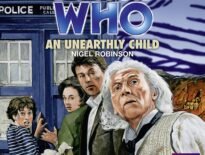Chris Chibnall scripts often present to me like transcripts of somebody trying to recount the events of a Russell T Davies series finale that they saw, with subtitles, on a TV over a dentist’s chair 12 years ago. They get the shape of it – the right moments occur and in roughly the correct order — but the nuance is lost under the sound of the suction. Doomsday of the Metaltrons borrowed with some discernment from previous classics, but the drama was rinsed and spat down the sink. Let me offer some illustrations.
Firstly, we have the Doctor’s decades in space choky, which were apparently spent agonising over her identity and the canon-spattering contortions of The Timeless Children. I say ‘apparently,’ because the Doctor’s pain is not dramatised; we find out about it during her conversation with her dashing male rescuer, Captain Jack Harkness. What we see of her decades in incarceration is her chatting with security cameras, bidding a cheery good morning to whatever was to hand in the costume department, and reciting Harry Potter. Norman Stanley Fletcher’s five years in HMP Slade — quite literally — offered more drama than this. Even the conversation with Jack manages to sidestep the dramatically fruitful parallel that they both have unreliable memories and questions about their identities.
Secondly, we have Yaz’s obsession with the Doctor, which amounts to ten months of her writing notes on the wall of the other TARDIS and a shove. We never get to see any of the notes, of course, nor gain any insight into what Yaz has been thinking, because we’re simply told about it by Graham and Ryan. The shove is the only actual dramatisation of Yaz’s feelings before she’s bundled off with Jack. RTD or Steven Moffat would have given us frosty looks over the console, barbed conversations; a vivid setpiece row, and an exuberant reconciliation. They’d have given us drama.
Then, thirdly, we have that conversation between Jack and Yaz. It’s an all too rare moment of character in the Chibnall Interregnum and a rumination that the ‘Best Before’ date on the Doctor’s new Favourite Earth-Lubber is generally comparable to a carton of UHT milk. But Sarah Jane Smith and Rose better explored the problems of what it’s like to come along for the ride when, more often than not, it won’t be your choice when it ends. But what really makes this scene ring false, though, is that it makes no dramatic sense for Yaz to be having this conversation with Jack. Jack seldom relied on the TARDIS for his lift; he was generally able to leave the Doctor and pick up things a century or two later if he chose. And unlike with most companions, the Doctor sees no vision of him withering and dying (even if that ‘big old face’ has had some work done). But dramatic sense is sacrificed to scheduling and promotion — John Barrowman was available (though seemingly not for a goodbye scene).

Fourthly, we have Ryan’s departure. Now, this is my favourite thing about the story, although I’m concerned that there will be a lot less free space in the TARDIS now he has gone. The dramatic approach to his leaving would have been to show us the last 10 months of his life on Earth without the Doctor, his rejuvenated friendships, his grief for his nan, even just an harrowing montage of his three hours working for Deliveroo — anything to show us why he had chosen to stay with Andred leave the Doctor. Instead, he simply tells the Doctor during a convenient, four minute TARDIS trip between the UK and Japan. Can anyone else remember when across the galaxy to Gallifrey was ‘a good 10 minutes in this old thing’? And then we were back to the bicycle scene from The Woman Who Fell to Earth, as if Chibnall actually wants to draw attention to the fact that Ryan has had scarcely an atom of development. Still, at least they cut the shot of Grace before it panned across to Anakin and Yoda.
Graham’s ‘goodbye’ was even more perfunctory. He’s had little development either. Audience affection for him – in my opinion – has not come from a well-written and dimensional Graham, but from the abundant but patched-in charm of Bradley Walsh. And now, having dispensed with one white, middle-aged light entertainer who does a bit of acting, we’ll be getting another in John Bishop. I don’t have anything against Bishop and perhaps he’ll work out well, but it has made me immensely grateful that John Nathan-Turner never saw fit to replace Kamelion with Stan Boardman.
Finally, a word about Jodie Whittaker. This should have been an opportunity for her to show the flint in her characterisation, to play through the fear, the hate, the resentment, and the angst that the Doctor’s nemeses have always provoked. It wouldn’t have been original, but it would have been growth for the ditzy big sister. We got none of that, though. The moodiest we saw the Doctor was in the promo shots for the story, and that was thanks to the lighting.
Ultimately, this was an amiable, moderately diverting 75 minutes of frenetic spectacle and whirling plot. I think newer fans and 7 to 12-year-olds would probably have really enjoyed it, and I won’t deride that: it’s an important job for any Who. Nor, you might say, does that sound much different from an RTD series finale. But The Parting of the Ways, Doomsday, Last of the Time Lords, and so on all had their hyperactive action and hypermobile logic anchored to a solid foundation of believable characters. If you care about the characters, if they are real to you, you care about the situation they’re in, whether it’s boyfriend trouble or the end of the universe.
Chris Chibnall’s locker appears to contain only plot devices, so his biggest dramatic moments, his revelations, feel external to the characters, as if someone occasionally drops a piano on the actors to generate incident. With his predecessors, the real drama came from within the characters and their relationships with each other. Revolution of the Daleks was mildly entertaining, but I couldn’t care about the events because I didn’t care about the people.
Oh, and there wasn’t actually a revolution.



